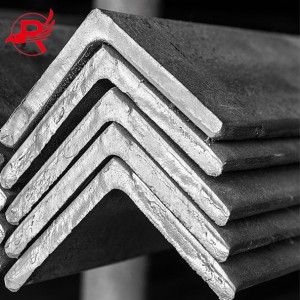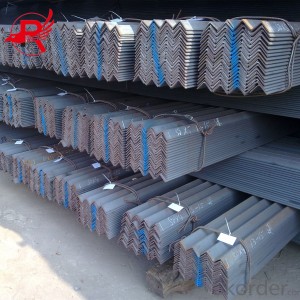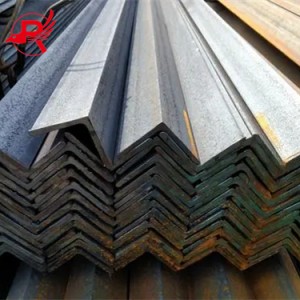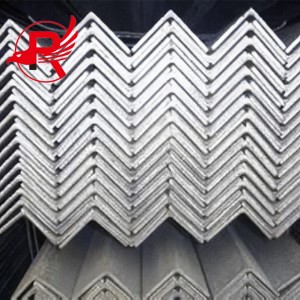ASTM Simbi Yakaenzana Yakagadzikwa Angle Isina Kuenzana Mutengo wakanaka uye mhando yepamusoro
MAITIRO EKUGADZIRA CHIGADZIRWA
Maitiro ekugadzirasimbi yekonakazhinji zvinosanganisira matanho anotevera:
Kugadzirira Zvinhu:Sarudza mapurati esimbi anoenderana nechimiro chedhizaini, chinhu chacho chinowanzo putirwa nekupisa kana kuputirwa nechando zvichienderana nezvinodiwa neprojekiti yako.
Kucheka:Cheka mapureti esimbi kuti ugadzire nzvimbo dzisina chinhu.
Kunyikisa:Kunyika simbi dzisina chinhu muchoto kuti dzipiswe kunogona kuwedzera kuyerera uye kushanda zvakanaka.
Kukombama/Kugadzira Cold:Uchishandisa muchina wekukotamisa unotonhora, maburi akadziiswa kare anomonerwa uye anokotamiswa kuita simbi isina makona akafanana.
Kucheka-Kusvika-Kureba:Cheka simbi isina kuenzana yakagadzirwa nechando kusvika pakureba kwaunoda.
Kuenzanisa & Kururamisa:Chigadzirwa chinofanira kunge chakatwasuka uye chakarurama pahukuru.
Kurapa Kwepamusoro:Tevedzera maitiro, akadai sekubvisa ngura kana kupenda, izvo zvinodzivirira ngura.
Kuongororwa kwezvinhu zvakapedzwa kuti zvionekwe pamusoro, saizi uye mhando yazvo.
Kurongedza & Kuchengeta:Rongedza simbi ine kona isina kuenzana, isa zita reruzivo rwechigadzirwa woisa mudura kuti iendeswe.
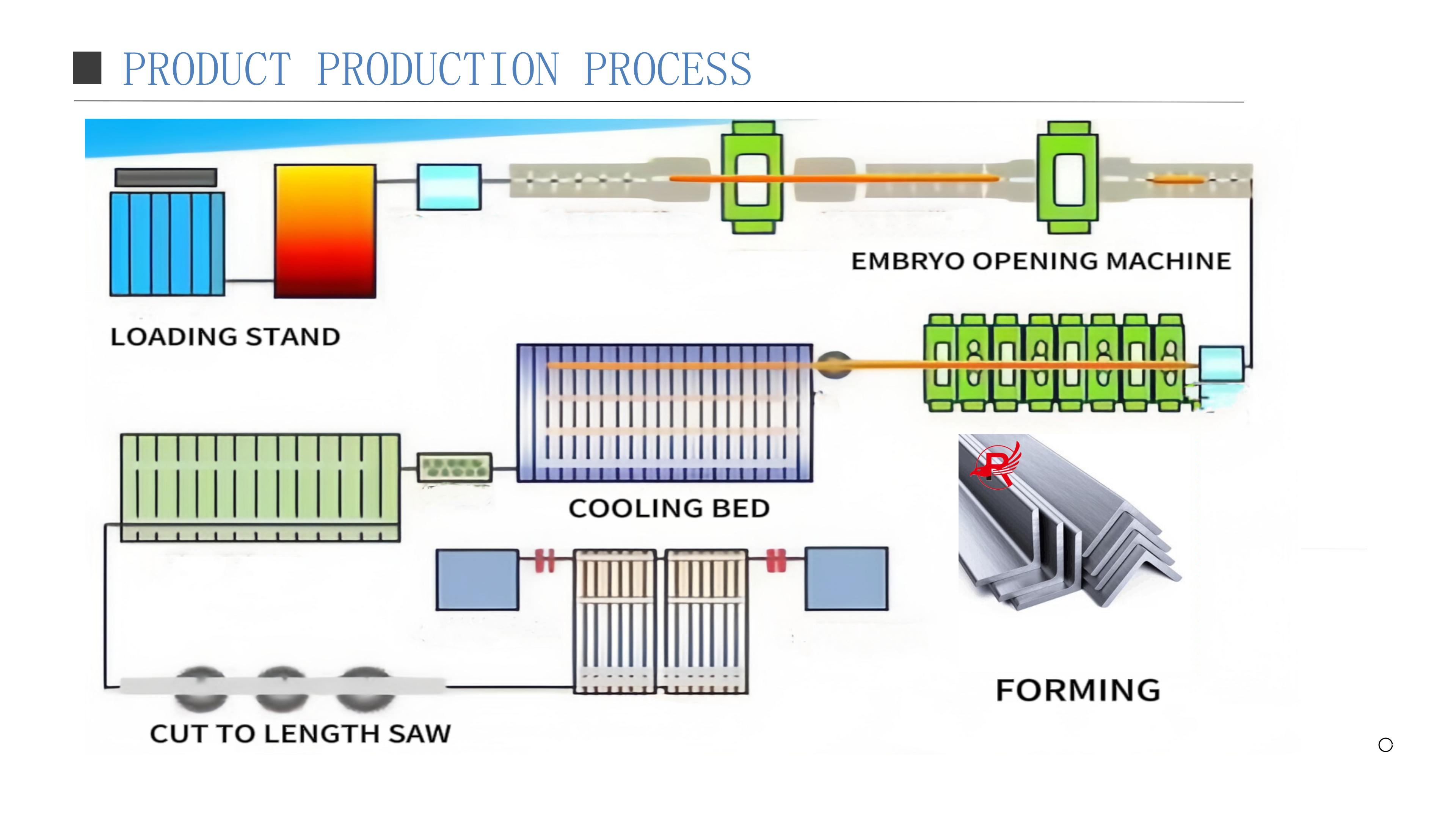
Ruzivo rweChigadzirwa
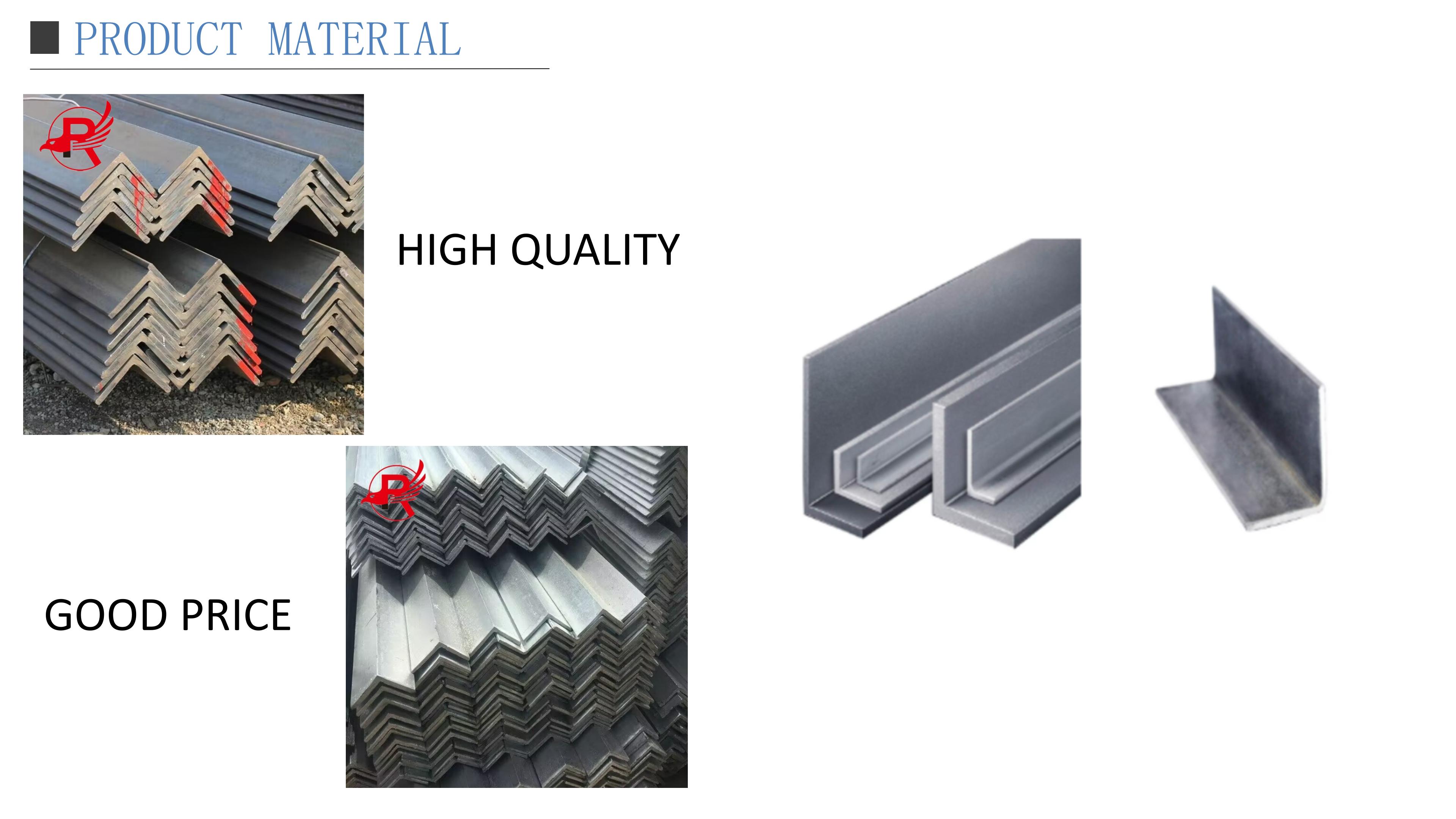
Kona yesimbi yekabhoni yakaenzana uye isina kuenzanaMipanda isimbi inoshandiswa zvakanyanya mukuvaka, kugadzira, uye mapurojekiti einjiniya. Mhando dzese dziri mbiri dzakaumbwa neL uye dzakagadzirwa nesimbi yekabhoni, asi dzakasiyana muhukuru hwemakumbo adzo.
Mabhawa Akaenzana Ekona:Makumbo maviri akaenzana pakureba pa90°, akakodzera mapuranga, mabhureki uye zvinosimbisa.
Mabhawa eAngle Asina Kuenzana:Gumbo racho rakareba, richigadzira kona yechiitiko, rinobatsira pakugadzirisa rutsigiro rwakasiyana-siyana kana mamiriro chaiwo emutoro.
Ose ari maviri anowanikwa muhukuru hwakajairwa, anogona kugadzirwa uye kugadzirwa nemichina zviri nyore uye simba resimbi yekabhoni rinoaita kuti akwanise kushandiswa mumabasa ekuvaka.
| chinhu | kukosha |
| Zvakajairika | ASTM, AiSi, DIN, EN, GB, JIS |
| Nzvimbo Yekwakabva | China |
| Rudzi | Bhawa rekona rakaenzana uye risina kuenzana |
| Kushandiswa | chimiro, chivakwa chemaindasitiri, indasitiri/Midziyo yemakemikari/Kicheni |
| Kushivirira | ±3% |
| Basa rekugadzirisa | Kukombama, Kuwedera, Kuboora, Kudhirowa, Kucheka |
| Chiwanikwa Kana Kwete | Isina Chiwanikwa |
| ukobvu | 0.5mm-10mm |
| Nguva Yokutumira | Mazuva 8-14 |
| Zita rechigadzirwa | Bhawa reAngle reSimbi Rinopisa Rakamoneredzwa |
| Basa rekugadzirisa | Kucheka |
| Chimiro | Kuenzana Kusaenzana |
| MOQ | 1 tani |
| Zvinhu | Q235/Q345/SS400/ST37-2/ST52/Q420/Q460/S235JR |
| Kureba | 6m-12m |
| Mutengo Nguva | CIF CFR FOB YAKAMBOSHANDA |
| Kurongedza | Kurongedza Kwakajairika |
| Mazwi akakosha | Bhawa reSimbi yeNgirozi |
| Simbi yakaenzana yekona | |||||||
| Saizi | Huremu | Saizi | Huremu | Saizi | Huremu | Saizi | Huremu |
| (MM) | (KG/M) | (MM) | (KG/M) | (MM) | (KG/M) | (MM) | (KG/M) |
| 20*3 | 0.889 | 56*3 | 2.648 | 80*7 | 8.525 | 12*10 | 19.133 |
| 20*4 | 1.145 | 56*4 | 3.489 | 80*8 | 9.658 | 125*12 | 22.696 |
| 25*3 | 1.124 | 56*5 | 4.337 | 80*10 | 11.874 | 12*14 | 26.193 |
| 25*4 | 1.459 | 56*6 | 5.168 | 90*6 | 8.35 | 140*10 | 21.488 |
| 30*3 | 1.373 | 63*4 | 3.907 | 90*7 | 9.656 | 140*12 | 25.522 |
| 30*4 | 1.786 | 63*5 | 4.822 | 90*8 | 10.946 | 140*14 | 29.49 |
| 36*3 | 1.656 | 63*6 | 5.721 | 90*10 | 13.476 | 140*16 | 33.393 |
| 36*4 | 2.163 | 63*8 | 7.469 | 90*12 | 15.94 | 160*10 | 24.729 |
| 36*5 | 2.654 | 63*10 | 9.151 | 100*6 | 9.366 | 160*12 | 29.391 |
| 40*2.5 | 2.306 | 70*4 | 4.372 | 100*7 | 10.83 | 160*14 | 33.987 |
| 40*3 | 1.852 | 70*5 | 5.697 | 100*8 | 12.276 | 160*16 | 38.518 |
| 40*4 | 2.422 | 70*6 | 6.406 | 100*10 | 15.12 | 180*12 | 33.159 |
| 40*5 | 2.976 | 70*7 | 7.398 | 100*12 | 17.898 | 180*14 | 38.383 |
| 45*3 | 2.088 | 70*8 | 8.373 | 100*14 | 20.611 | 180*16 | 43.542 |
| 45*4 | 2.736 | 75*5 | 5.818 | 100*16 | 23.257 | 180*18 | 48.634 |
| 45*5 | 3.369 | 75*6 | 6.905 | 110*7 | 11.928 | 200*14 | 42.894 |
| 45*6 | 3.985 | 75*7 | 7.976 | 110*8 | 13.532 | 200*16 | 48.68 |
| 50*3 | 2.332 | 75*8 | 9.03 | 110*10 | 16.69 | 200*18 | 54.401 |
| 50*4 | 3.059 | 75*10 | 11.089 | 110*12 | 19.782 | 200*20 | 60.056 |
| 50*5 | 3.77 | 80*5 | 6.211 | 110*14 | 22.809 | 200*24 | 71.168 |
| 50*6 | 4.456 | 80*6 | 7.376 | 125*8 | 15.504 | ||
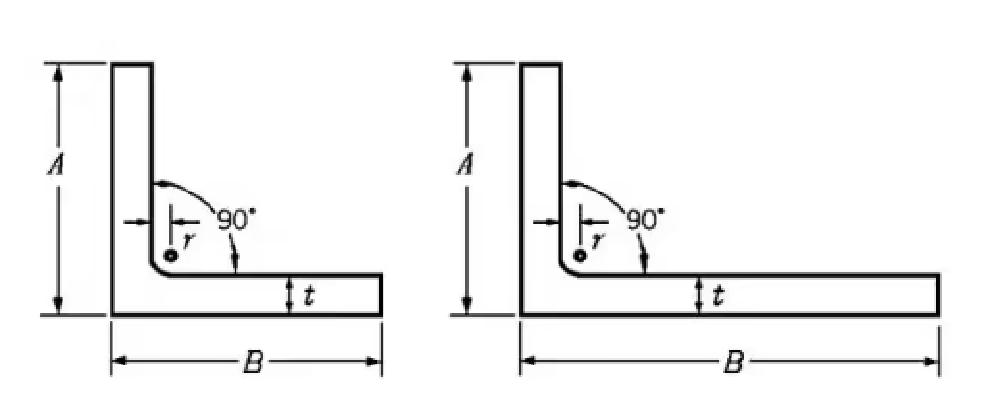
ASTM Simbi Yakaenzana YeAngle
Giredhi: A36、A709、A572
Saizi: 20x20mm-250x250mm
Zvakajairika:ASTM A36/A6M-14
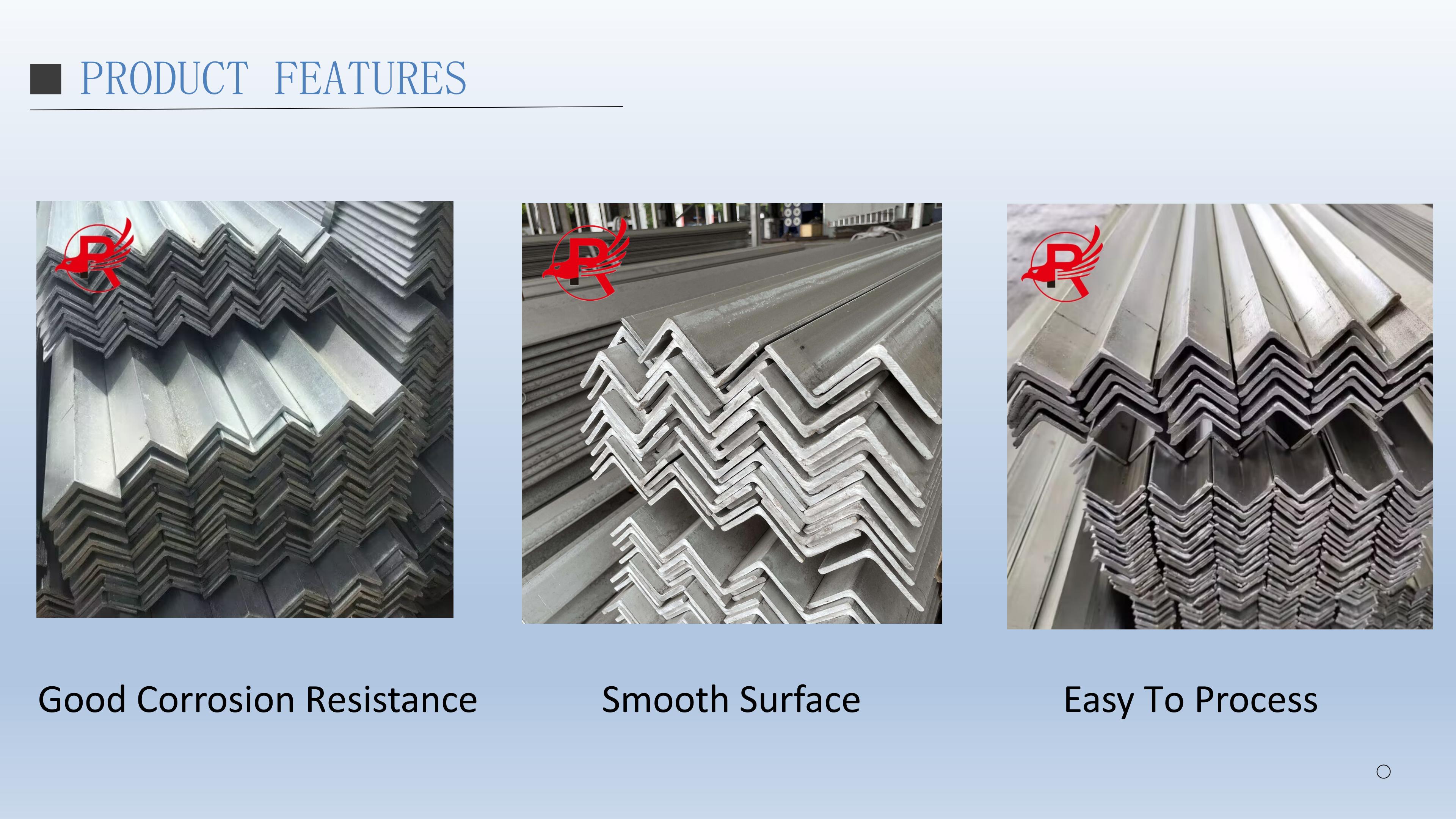

Zvinhu zvirimo
Mabhawa eSimbi Akatsetseka Akaenzana(inonziwo angle iron kana simbi yakaita seL) inoshandiswa zvakanyanya mukuvaka nemapurojekiti emaindasitiri nekuda kwekushanda kwavo kwakasiyana-siyana uye mashandiro avo mukuvaka.
-
Angle Yekurudyi:Makumbo akaenzana pakureba anoumba kona ye90°, yakakodzera kuumbwa, kusungirirwa, uye kutsigira.
-
Simba:Yakagadzirwa nesimbi isina kuomarara, ine simba rakanaka uye inokwanisa kutakura mutoro.
-
Kugona kusundira:Inosungirirwa nyore nyore kuti ishandiswe nenzira inochinjika.
-
Kugona kushandiswa:Inogona kuchekwa kana kugadzirwa nemachina zvichienderana nehurefu hwakatarwa uye makona.
-
Kuramba Kuora:Zvingada machira ekudzivirira munzvimbo dzakaoma.
-
Kuchinja-chinja:Inoshandiswa mumafuremu ekuvaka, mukusimbisa zvivakwa, uye muzvikamu zvakasiyana-siyana zvemaindasitiri.

Kushandiswa
Kuvaka Zvishoma:Mitsetse yemakona yakaenzana inoshandiswa mukuvaka nemabasa ekuvaka emafuremu, mabraces nekutsigira, mukugadzira michina, zvishandiso uye masisitimu ekuchengetera zvinhu uye mumabasa ekuvaka emabhureki, maguard emakona uye zvinhu zvekushongedza.
Kugona kuchinjika uye kugona kuchinjika:Zvigadzirwa zvinogona kuchekwa nemuchina uye kusungirirwa zviri nyore kuti zvigadzirwe uye zvigadzirwe nenzira yaunoda.
Simba uye Kutakura Mutoro:Chimiro chakafanana cheL uye dhizaini yakasimba zvinoita kuti mutoro uwedzere uye kugadzikana kwechimiro.
Kupedzisa & Kuputira:Chigadzirwa ichi chakagadzirwa sechigayo kana kuti chine machira ekudzivirira kuti chirambe chakasimba uye chakaora zvichienderana nenzvimbo yacho.
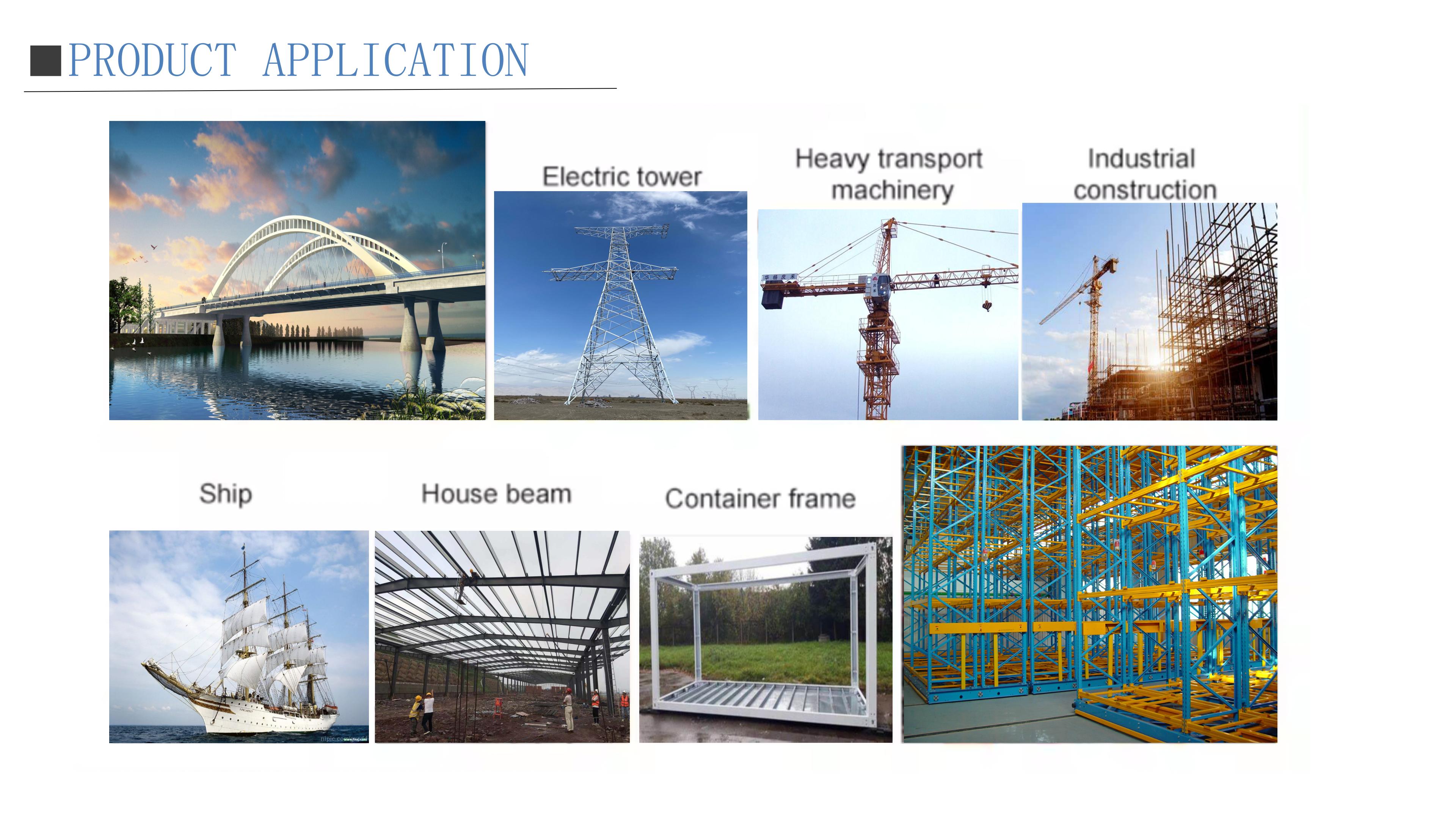
Kurongedza & Kutumira
Kuendesa simbi dzemakona kwakachengeteka kana zvikaiswa zvakanaka. Dzimwe dzenzira ndeidzi:
Kubatanidza:Mabhawa anosungwa nemabhande esimbi kana waya kudzivirira kufamba kana kukuvara panguva yekufambisa.
Mapeti ekudzivirira:Matanda aya akachengetedzwa kubva pakusvibiswa nehunyoro, guruva nezvimwe zvinosvibisa nepurasitiki, bepa kana zvimwe zvinhu zvakafanana.
Mabhokisi emapuranga kana maskidhi:Zvinopa hwaro hwakasimba uye dziviriro yakawanda kubva pakubata zvisina kunaka.
Kunyora mazita:Mapakeji akanyorwa saizi, huremu, giredhi resimbi uye mirairo yakakosha yekubata kuti zvive nyore kuziva.
Nzvimbo Yakachengeteka:Mabhawa akanyatsorongedzwa zvakanaka kuti agare ari panzvimbo yawo zvichiita kuti kutakurwa kwakachengeteka.
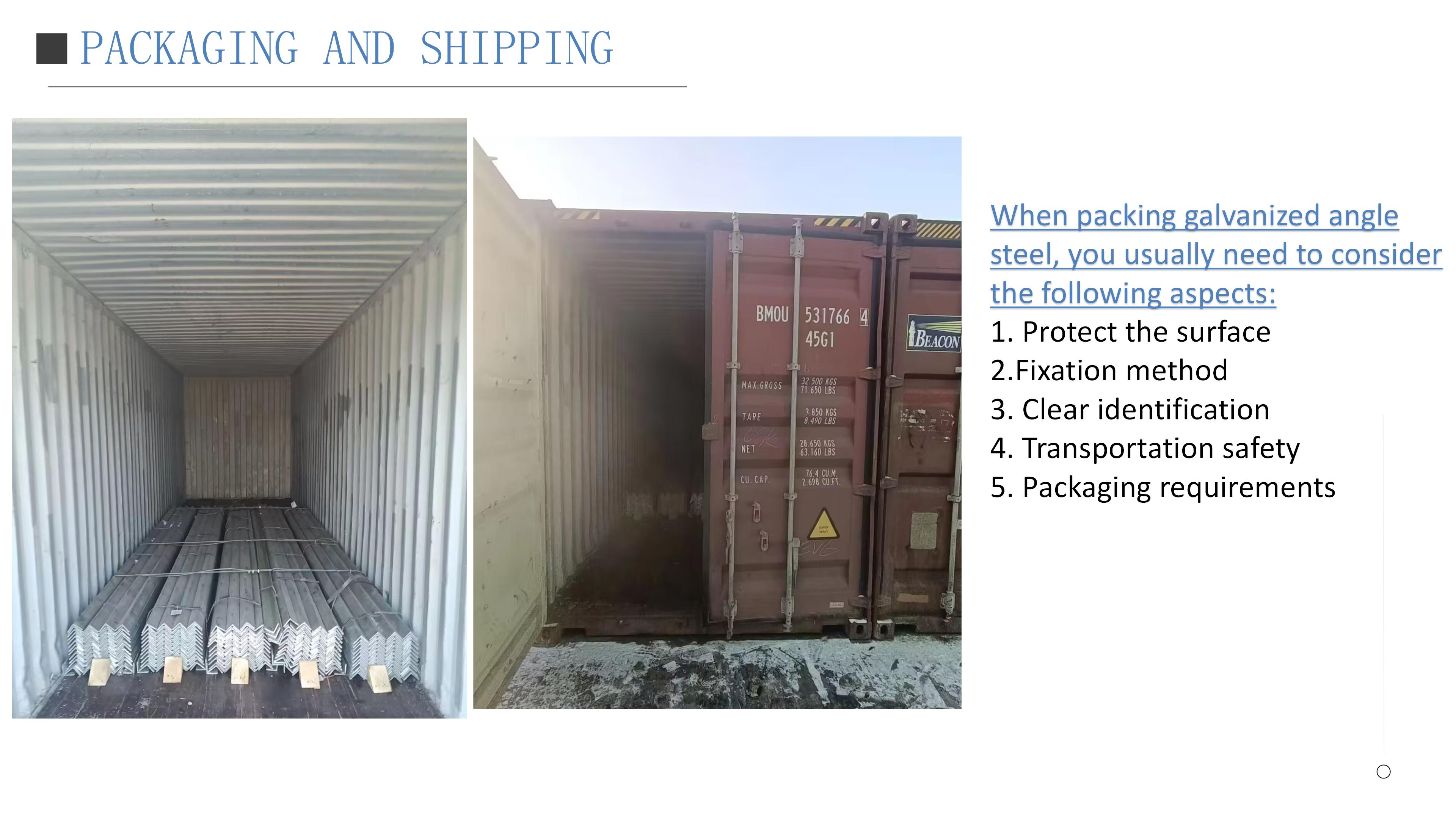
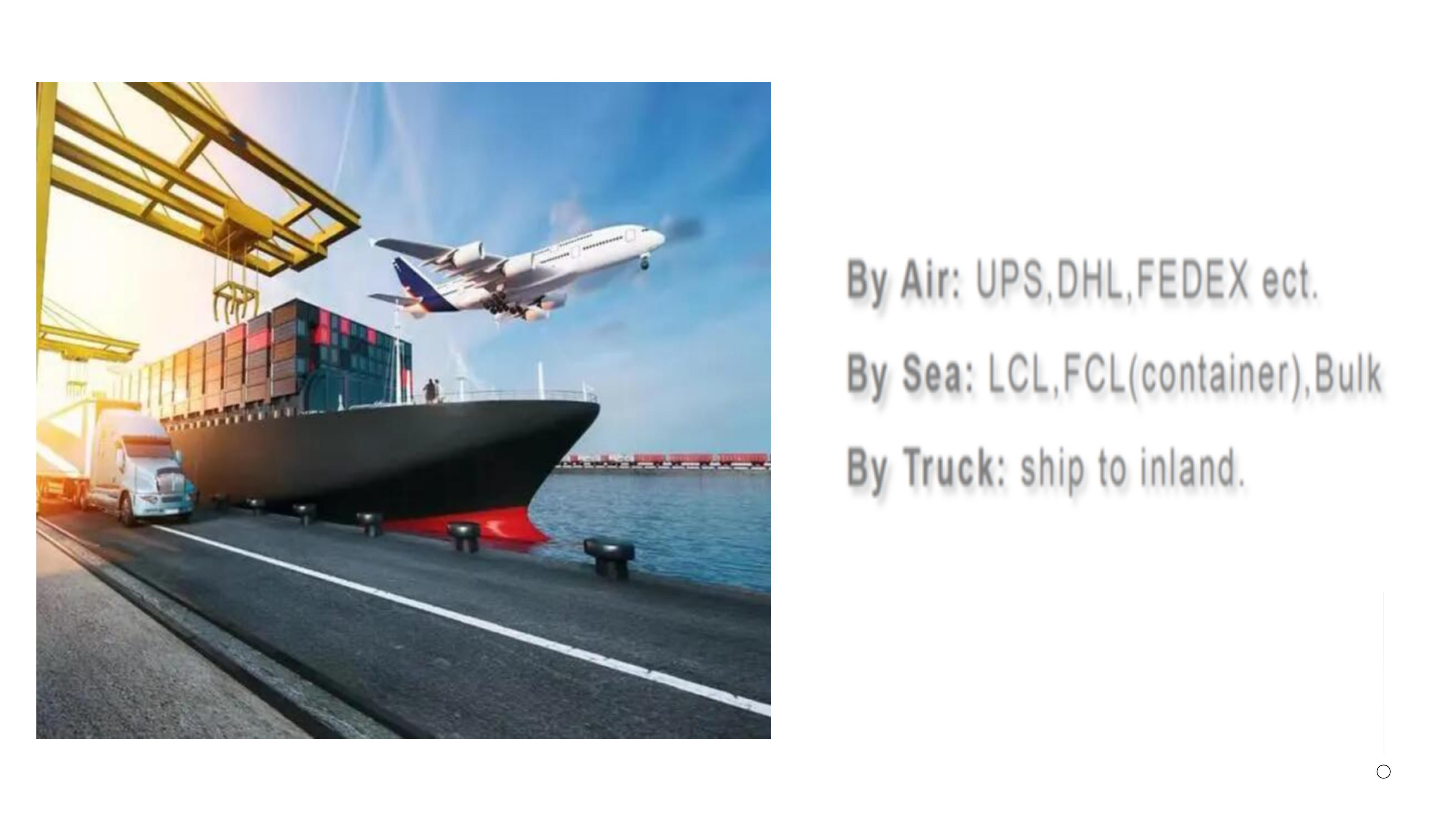
KUSHANYIRA KWEVATENGI
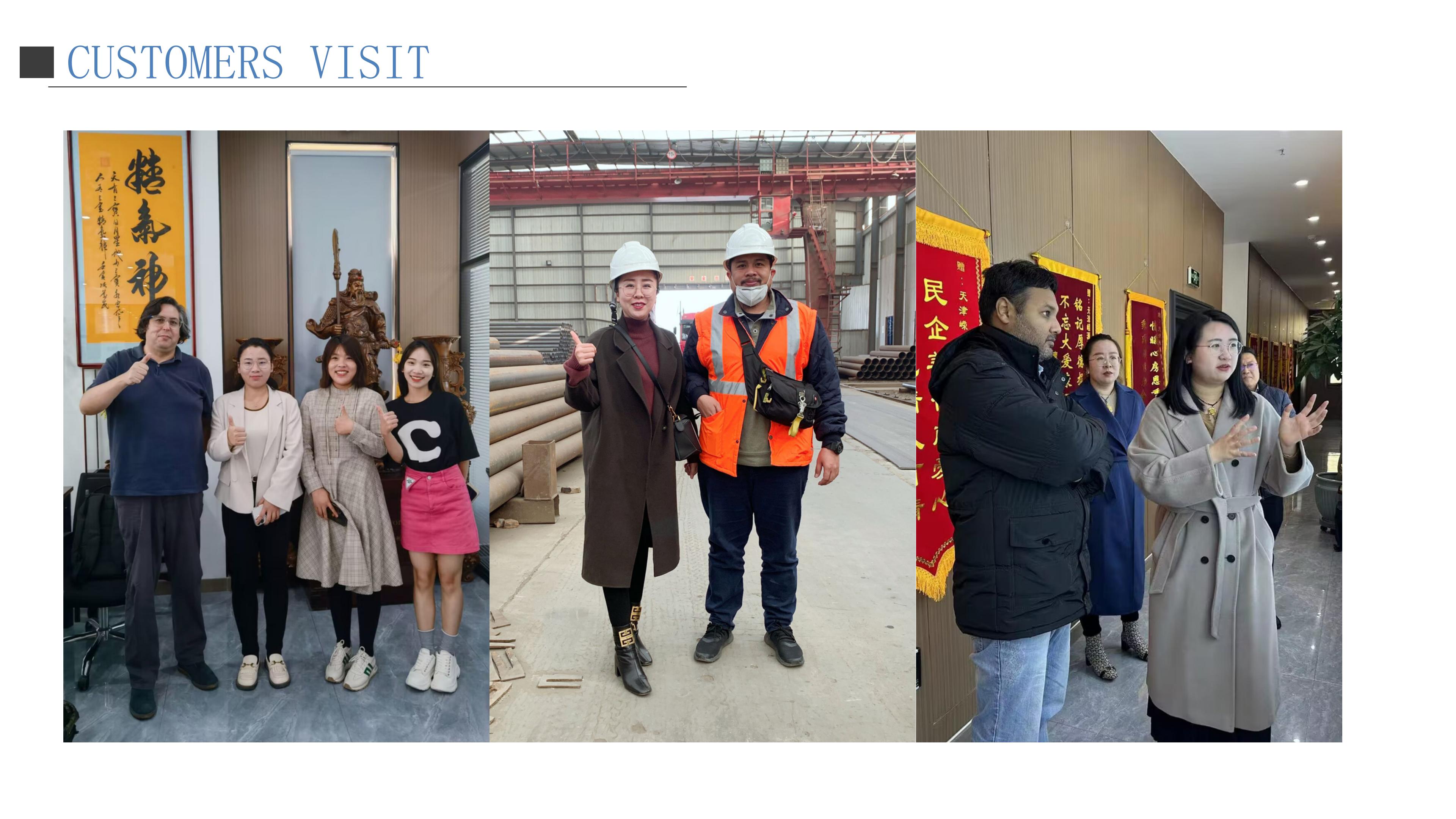
Mibvunzo Inowanzo bvunzwa
1. Ungakumbira sei mutengo?
Tisiyei meseji uye tichakupindurai nekukurumidza sezvinobvira!
2. Kutumirwa kunogona kuvimbiswa here?
Ehe, tinovimbisa kutumirwa nenguva uye zvigadzirwa zvedu zvemhando yepamusoro.
3. Ndingawana mienzaniso here?
Ehe, sampuli hadzina muripo uye dzinogona kugadzirwa zvichienderana nemuenzaniso wako kana mifananidzo.
4. Mitemo yekubhadhara?
Mari yakajairika ndeye 30% dhipoziti, mari yasara ichienzaniswa neB/L. EXW, FOB, CFR, CIF.
5. Kuongororwa nemunhu wechitatu here?
Ehe, kuongororwa kwebato rechitatu kunogamuchirwa.
6. Ungavimba sei nekambani yako?
Isu tine ruzivo rwekutengesa simbi kwemakore mazhinji muTianjin uye nzira dzese dzekusimbisa dzinogamuchirwa.



